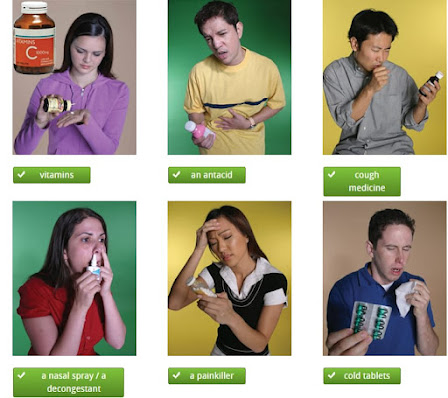UNIT 2
The importance of taking care of health also encompasses the psychological aspect and emotions. Having a positive attitude towards life, establishing healthy personal relationships, limiting stressful situations and promoting optimism are practices that we cannot lose sight of, since they help us to improve our health.
HUMAN BODY PARTS.
SHOW CONCERN AND OFFER HELP.
VOCABULARY:
1.
PRACTICE: IF I FEEL DIZZY, I TAKE MAREOL.
2.
PRACTICE: IF YOU HAVE BEEN SNEEZING THESE DAYS, YOU CAN TAKE LORATADINE.
3.
PRACTICE: I ATE AN ICE CREAM AND I HAVE PAIN STOMACH, I HAVE TO DRINK MYLANTA.
PRACTICING ON THE PLATFORM
MEDICAL USE PROCEDURES:
MEDICATIONS IN CASE YOU FEEL BAD...
SITUATIONS
SECOND TOPIC TAUGHT IN CLASS:
MODALS VERBS:
A modal verb is a verb that is used in combination with a normal verb. While auxiliary verbs help make questions and negatives and put a verb in a particular tense, modal verbs add a special meaning. For example, the phrase “They go to school” can change meaning with a modal verb in the following ways:- They must go to school. = They have an obligation to go.- They can go to school. = They have the possibility to go.- They might go to school. = It's possible they will go to school.
Modal verbs can express obligation, advice, permission, offers, the future, and possibility.
MAY AND MIGHT:Are modal verbs that can have a similar meaning. They can be used to describe two ideas:
- Possibility (in the past, present or future)- PermissionExamples:- I may go to the beach tomorrow (probabilidad alta).- I might go to the beach tomorrow (probabilidad baja).
BE ABLE TO:Is used in English to talk about abilities and also to talk about having the resources to do something. This expression has two possible translations in Spanish: SER CAPAZ DE and PODER.
PRACTICING ON THE PLATFORM...
PRACTICE: IF I FEEL DIZZY, I TAKE MAREOL.
2.
3.
PRACTICING ON THE PLATFORM
MEDICAL USE PROCEDURES:
MEDICATIONS IN CASE YOU FEEL BAD...
SITUATIONS
SECOND TOPIC TAUGHT IN CLASS:
MODALS VERBS:
A modal verb is a verb that is used in combination with a normal verb. While auxiliary verbs help make questions and negatives and put a verb in a particular tense, modal verbs add a special meaning. For example, the phrase “They go to school” can change meaning with a modal verb in the following ways:
- They must go to school. = They have an obligation to go.
- They can go to school. = They have the possibility to go.
- They might go to school. = It's possible they will go to school.
Modal verbs can express obligation, advice, permission, offers, the future, and possibility.
MAY AND MIGHT:
Are modal verbs that can have a similar meaning. They can be used to describe two ideas:
- Possibility (in the past, present or future)
- Permission
Examples:
- I may go to the beach tomorrow (probabilidad alta).
- I might go to the beach tomorrow (probabilidad baja).
BE ABLE TO:
Is used in English to talk about abilities and also to talk about having the resources to do something. This expression has two possible translations in Spanish: SER CAPAZ DE and PODER.
PRACTICING ON THE PLATFORM...





.jpeg)
.jpeg)

.jpeg)
.jpeg)
.jpeg)
.jpeg)

.jpeg)


Comentarios
Publicar un comentario